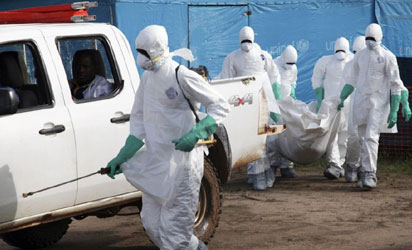Port Harcourt-The Rivers State government has been able to reach out to about 96 per cent of the high risk cases who had primary contacts with the late Dr. Iyke Samuel Enemou, who died on Friday, August 22, from the dreaded Ebola virus which he contacted after treating a Nigerian diplomat, Olu-Ibukun Koye, a protocol officer with the Economic Community of West African States, ECOWAS.
Commissioner of Health, Dr. Samson Parker, told journalists, at his office, yesterday, that the state government has attained an appreciable success in tracing those who had primary contacts with the late doctor. He disclosed: “As at Sunday, contact tracing was going on. But on Monday, we had a report that almost all of them have been contacted. We now have 96% coverage, which is huge and which is a good success, and by now, as we are talking, they would have finished everything. So, we are on it and almost all of them have been contacted.”
Dr. Parker blamed the parastatals that managed the nation’s airports for their collective lapses that enabled Koye to sneak into Rivers State through the Port Harcourt International Airport, at Omaigwa, before being lodged into a room at Mandate Gardens Hotel, at Rumuokoro, by the late Dr. Enemou.
He stated: “If you remember when this thing started, we were a bit worried about our point of entry. You know the airports are managed by parastatals of the Federal Government and we had issues with them, but with the partnership of the World Health Organisation, WHO, and the team here, some of the materials we needed; the temoscans are available and they are training persons to take over. They are bringing experts in to train those ones on how to organise the points of entry.”
The commissioner explained: “Ebola response is not just a government thing; it is not the Ministry of Health, it is all stakeholders, remember. That is why we have what we call the stakeholders committee in Rivers State; the organised private sector is involved; private hospitals are involved and the government sector is there”
Dr. Parker stressed: “We had people from Emory University Hospital who came to train our health officials and now WHO is also giving specific private hospital training. It is not just enough to get Personal Protective Equipments, PPE’s. Having PPE’s is just like giving your child a car to drive without training him on how to drive. It is probably more dangerous to give some PPE’s when the person doesn’t know how to use the PPE.”
Country Director of the WHO in Nigeria, Rui Vaz,who was at the briefing with the commissioner for health, commended Governor Chibuike Rotimi Amaechi and Dr. Parker for the proactive measures that they have put in place to contain the spread of the ebola virus in Rivers State.
He assured: “I will like to highlight that Ebola can be contained and we are going to contain it; there is no doubt, but everything depends on all of us. It is not only the responsibility of the Ministry of Health. This is a cross-cutting issue, it’s an inter-sartorial response, it requires attention, and the critical matter is the leadership and ownership of the process.”
“WHO is in the country to provide technical support; we are a technical agency, we are not a financial agency. It is very important to highlight that there is a strong commitment by the Governor and the Commissioner, and also, other entities. I see also the high involvement in the response of the private sector”, Vaz emphasized.
He added: “Rivers State is an important economic front in this country; that requires some particular attention. WHO as a technical agency, since the information of the first case, we deployed immediately, our colleagues from Lagos and they came here and first, they helped to establish the emergency operation centre (EOC) and it is already done. We also brought our colleagues with very high expertise from Lagos and they are here. We also brought experts from our headquarters in Geneva. We have people from our regional office; we have people from our country office.”
Vaz pointed out that “the most important thing in Ebola control is the early diagnosis of any potential suspected cases and takes necessary precautions, in terms of isolation where it is needed, and other measures to stop the chain of infection.”
He warned: “When we speak about training, we should involve everybody. The disease doesn’t know if it is a private or a public hospital. We need to train everybody to be aware. This is why the role of the media is critical.”
Source: The Nigerian Observer

